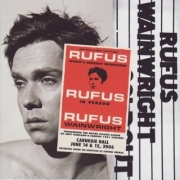 With the temperature dropping, it's time to find someone to keep you warm. Find your hookups with our online dating guide!
With the temperature dropping, it's time to find someone to keep you warm. Find your hookups with our online dating guide!
Rufus Does Judy
at Carnegie Hall
- Pop
- 2007
- Buy the CD
Reviewed by Jeff Giles
()
In this context, Rufus Does Judy at Carnegie Hall – which finds Wainwright faithfully recreating Judy Garland’s iconic 1961 concert – can be seen as something of a limited return to form. Artistically, it’s a somewhat eyebrow-raising decision from an artist who, for better or worse, has never stopped moving – but whatever it might say about the well-being of Wainwright’s muse, it has undoubtedly helped restore some of the glorious Technicolor luster to his voice. Wainwright’s such a gifted songwriter and arranger that his clear, elastic vocals haven’t always been given the attention they deserve, but Garland’s Carnegie set was meant to be a singer’s showcase, and the intervening decades haven’t changed that – if anything, the Pro Tools era has helped shorten the list of stars with the pipes to carry these songs in concert. (Never mind back-to-back, in gold lamé.)
Judy Garland died almost 40 years ago, but she remains a gay icon; appropriately, Wainwright – who’s developing into something of a gay icon himself – camps it up here. Listening to his between-song patter, you can almost trick yourself into thinking you’re being serenaded by Richard Simmons, and on the DVD (also titled Rufus Does Judy, but filmed at London’s Palladium), his stage swanning makes Carson Kressly look like Paul Bunyan. It isn’t strictly relevant to the music, but it does underscore how much fun Wainwright’s having here – and why his fans, even if they have zero interest in anything involving Judy Garland, stand at least an even chance of enjoying the hell out of this set.
Unlike a lot of dual-format releases, a case can legitimately be made for owning both versions of Rufus Does Judy – they both feature the same set, obviously, but they’re different shows, which adds a little something extra to what’s commonly a thinly disguised exercise in milking the fans. The cinematography is fine, if not exactly thrilling, but there’s still something incredibly cool about watching a singer front a 40-piece orchestra – and watching Wainwright run down the set really underscores just how taxing it really is.
It’s still hard not to wish this was an album of new material; on the other hand, Release the Stars isn’t even a year old, so it isn’t like Wainwright is loafing. It’s a holding pattern, but a pleasurable one. Here’s hoping some of the incredible energy in this fond tribute spills over to his next full-length.
You can follow us on Twitter and Facebook for content updates. Also, sign up for our email list for weekly updates and check us out on Google+ as well.











